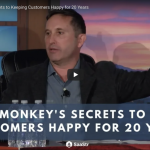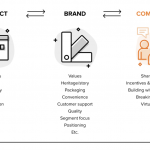- Like
- SHARE
- Digg
- Del
- Tumblr
- VKontakte
- Flattr
- Buffer
- Love This
- Save
- Odnoklassniki
- Meneame
- Blogger
- Amazon
- Yahoo Mail
- Gmail
- AOL
- Newsvine
- HackerNews
- Evernote
- MySpace
- Mail.ru
- Viadeo
- Line
- Comments
- Yummly
- SMS
- Viber
- Telegram
- JOIN
- Skype
- Facebook Messenger
- Kakao
- LiveJournal
- Yammer
- Edgar
- Fintel
- Mix
- Instapaper
- Copy Link
Following the success of Instagram Stories, Facebook Stories, Snapchat, and now LinkedIn Stories, Twitter’s finally launched its own story feature.
It’s called Twitter Fleets.
The launch of Twitter Fleets comes after a successful pilot which began nine months ago. In March, Twitter began testing the feature in Brazil and continued to add other countries to its pilot until unveiling the feature in the U.S.
But, how does Fleets work and how might your brand leverage it in your marketing strategy? We’ll walk you through everything we know so far below.
What are Twitter Fleets?
Fleets are temporary tweets that look like vertical Instagram Stories. This content disappears after 24 hours and cannot be retweeted, replied to publicly, or embedded on to other pages.
Fleets, or fleeting tweets, are similar to Instagram Stories. Like Instagram’s layout, Twitter users who have Fleets will see a bar with circular Story icons from each account above their Twitter feed.
From their homepage, a user can tap on a circular Fleet icon to see what an account posted in their Fleets area.
-Nov-17-2020-10-21-58-53-PM.jpg?width=200&name=Image%20from%20iOS%20(1)-Nov-17-2020-10-21-58-53-PM.jpg)
Unlike tweets, the text, video, or photo published shows up in a vertical format, similar to Instagram Stories. But, if you like the Tweet format, you can also share a one in a Fleet to draw more attention to it, like McDonalds does below:
-2.png?width=200&name=Image%20from%20iOS%20(13)-2.png)
How to Use Twitter Fleets
1. Tap the circle with your face in it in the Fleets bar.
Like Instagram and LinkedIn Stories, the Fleets bar is above your feed and your Fleet icon will be on the right side, as seen the first screenshot shown above.
2. Create your content.
Also similar to other story platforms, you’ll see a simple camera screen where you can take a picture, film a video, upload content from your camera roll, or create a Fleet with a basic background color and text comment.
-2.png?width=200&name=Image%20from%20iOS%20(14)-2.png)
3. Add text and descriptions.
Once you’ve designated your content, you can tap “Aa” to add text, the color icon to change the color of the text, or the ALT icon to add an alt-text description for those with screen readers.
4. Publish your Fleet.
When you’re done, you can simply tap “Fleet” in the upper right-hand corner to publish what you’ve created.
The Motivation Behind Twitter Fleets
Because Fleets disappear after 24 hours, just like Instagram Stories, Twitter says it’s aiming to see if its ephemeral content will promote deeper and more personal conversations on the platform.
To make Fleets even more “personal,” other users cannot retweet or share the link to them. Twitter users can also only reply to Fleets via direct message.
When Twitter started its Fleets pilot, the company surveyed some of the first beta testers. As expected, most who used Fleets said they felt more comfortable publishing more personal thoughts or opinions than they’d publish in standard tweets. This was because the users knew that this content would eventually disappear.
“We hope that those people who are not usually comfortable with Tweeting use Fleets to talk about the reflections that come to their head,” said Mo Al Adham, a Twitter product manager explained, in Twitter’s announcement.
Twitter Fleets also signifies yet another move social media platforms are making towards embracing ephemeral content.
While disappearing video, text, and Stories might’ve sounded like gimmicks back in the earlier days of social media, ephemeral content features are increasingly common in today’s online landscape.
Although Fleets might not be the center of brand strategies just yet, you can still begin identifying potential ephemeral content that could ultimately work on the platform. Below, I’ll highlight a few commonly used ephemeral tactics that could boost brand awareness on Twitter Fleets.
How Brands Could Use Twitter Fleets
1. Publishing Limited-Time Offers
Want to sell out a lot of one product quickly? Or, offer a promotion to your most engaged Twitter followers? One great way to do both of these things could be using Fleets to promote temporary sales, offers, or coupon codes.
Since Fleets only last for 24 hours, users won’t be able to find the codes or promotions forever. That could mean that these audiences might feel a sense of urgency to make a purchase, use a given coupon code, or just visit your website to learn more about your product.

2. Hosting Daily Giveaways
Along with posting about short-term sales and coupon codes, Fleets — and other Story platforms — could be great places to promote giveaways. With a Story-like platform, you can include more text, video, and photo about the products you’re giving away and explain the rules of your giveaway within multiple pages.
While you can announce a giveaway in standard tweets, all of this information might have to be published in multiple posts or a thread due to Twitter’s character count limitations. And, because Twitter’s feed is so fast-paced, you’ll likely need to post more than once to get a large number of contest entries in a limited time.
With a platform like Fleets, you’ll not only be able to post multiple pages of tweets in the same Fleet story, but your content will also appear in the Fleets area above a user’s feed. This might mean that there’s less risk in your contest announcement being buried by tweets from other accounts.
Additionally, because Fleets and Stories only last for 24 hours, viewers might feel a sense of urgency. Like with coupons or sales, audiences might want to enter your contest, view your entire Story, or go to your website before the Fleet disappears.
To give you some added inspiration, here’s an example of a contest that a brand once ran on Instagram Stories:
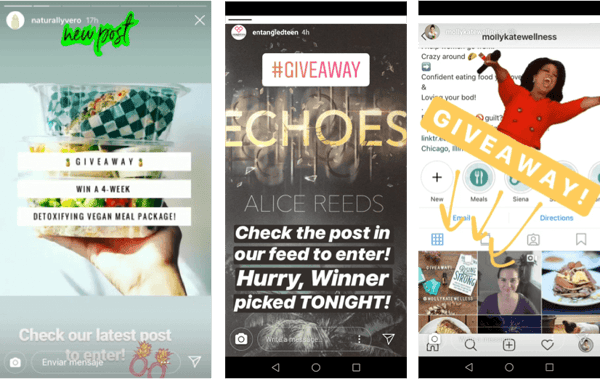
3. Embracing Live Events on Social Media
Want to leverage live events or short-term news in your social media marketing strategy without it clogging up your Twitter profile? Consider covering the event with ephemeral content. That way, when the event is over, users focus back on your overall brand and business.
In this example below, the NBA’s Instagram Story featured coverage of the Toronto Raptors parade in Ontario, Canada. At this point in the Story, a Raptors team member took selfies with the rapper, Drake.
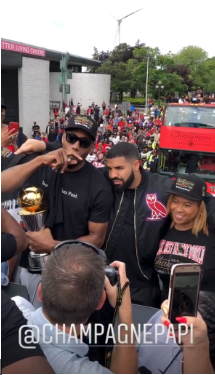
4. Interacting With Loyal Fans
While Twitter’s highly public platform already allows brands many opportunities to find and interact directly with fans, Fleets could also be a helpful tool for this.
On Instagram and Facebook Stories, you might regularly see content where brands ask users to DM them questions or content. Then, a brand might create a Story with user-generated quotes, images, or videos. This tactic makes users who participated feel like the brand cares about their thoughts. Meanwhile, an interactive Story like this allows other audiences to see that the brand appreciates its most engaged followers.
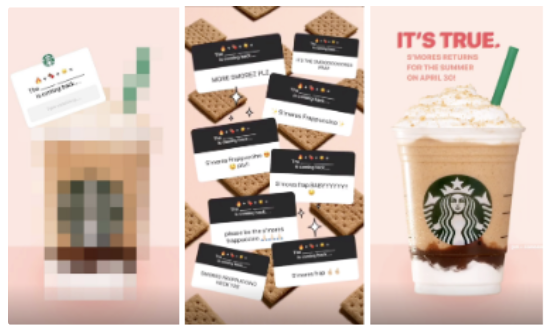
Aside from question-and-answer interactions, you could also go one step further by publishing Fleets with user-generated content from customers or fans. One brand that frequently does this on Instagram Stories and Facebook is Planet Fitness. In the story below, they highlight fitness journey photos sent to them by their actual customers:
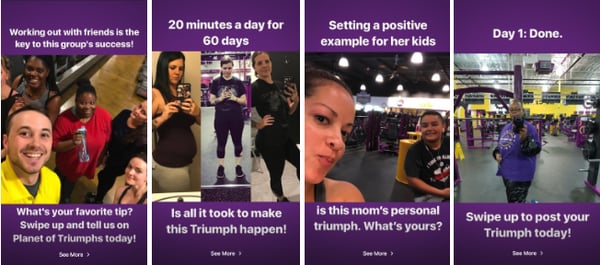
Not only does this Story allow loyal Planet Fitness fans to contribute to the brand’s social media content, but it also allows prospects to see how real people have benefited from the gym’s services.
5. Offering Behind-the-Scenes Content
Most of us know that people love seeing behind-the-scenes content from celebrities, athletes, and influencers on Instagram Stories, Facebook Stories, and Snapchat. But, research shows that consumers also enjoy behind-the-scenes material from brands.
While tweets offer brands a platform to create quick well-worded posts or publish heavy-lift content, Fleets could allow brands to show audiences behind-the-scenes content or insights that make them look more authentic and relatable. This is something we’ve seen brands frequently do on their temporary Instagram Stories.
In the Story below, the New England-based Caffe Nero highlights a Barista of the Year competition that it holds with its staff every year. The Story highlights how Caffe Nero baristas are dedicated to serving customers and shows off an authentic piece of the restaurant’s company culture that many customers might not know about.
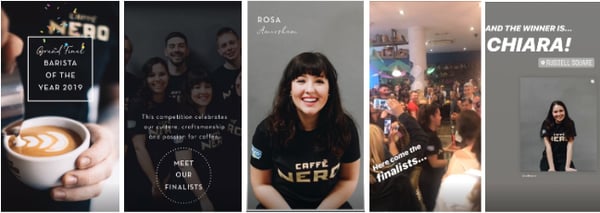
5. Informing Audiences About Complex Industry Topics
When you craft a tweet, you need to sum up your message in 280 characters or start a thread. But with Fleets or other social media Stories, you can add further information or insight with photos, videos, or multiple pages of text. This could allow brands to offer Twitter users a stronger variation of valuable, easy-to-create content that isn’t limited to tiny tweets, pricey marketing videos, or time-consuming live streams.
Here’s an example of how HubSpot discusses more complex industry topics via Instagram Stories. While you might not be able to add the same level of imagery to Fleets content, you could potentially leverage multiple pages of text in a similar way.
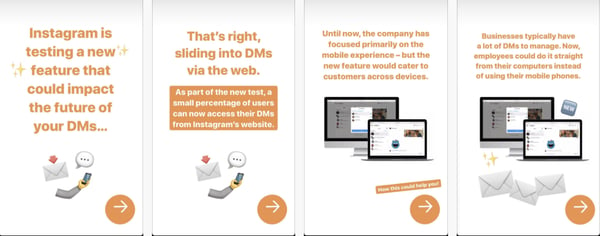
Navigating Ephemeral Content
Can content that disappears really leave an impression? Well, if Snapchat, Instagram, Facebook, LinkedIn, and Twitter have taught us anything — the answer to that question is, “Yes!”
While ephemeral platforms are a new and exciting opportunity, it does take creativity and brainstorming to create content that will grab your audience in a memorable way.
To get better acquainted with key ephemeral content tips and strategies, check out this introduction to the content type. Then, learn more about how major brands are leveraging current ephemeral platforms like Instagram Stories, Facebook Stories, and Snapchat.
Editor’s Note: This blog post was originally published to cover the Twitter Fleets pilot in May 2020, but was updated in November 2020 for comprehensiveness and freshness.
Originally published Nov 22, 2020 12:00:00 PM, updated November 22 2020

![Download Now: How to Use Twitter for Business [Free Kit]](https://no-cache.hubspot.com/cta/default/53/190da11f-58c6-41d5-a397-843618741e09.png)
-2.png?width=200&name=Image%20from%20iOS%20(15)-2.png)
